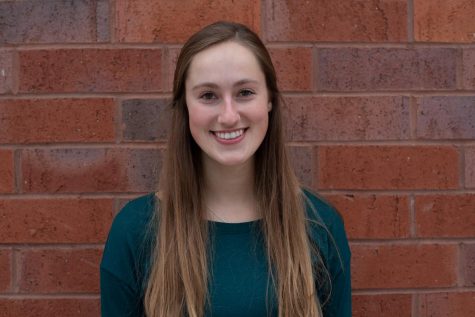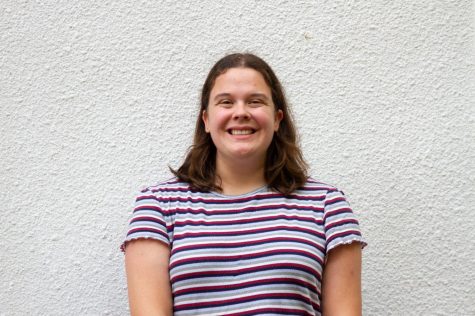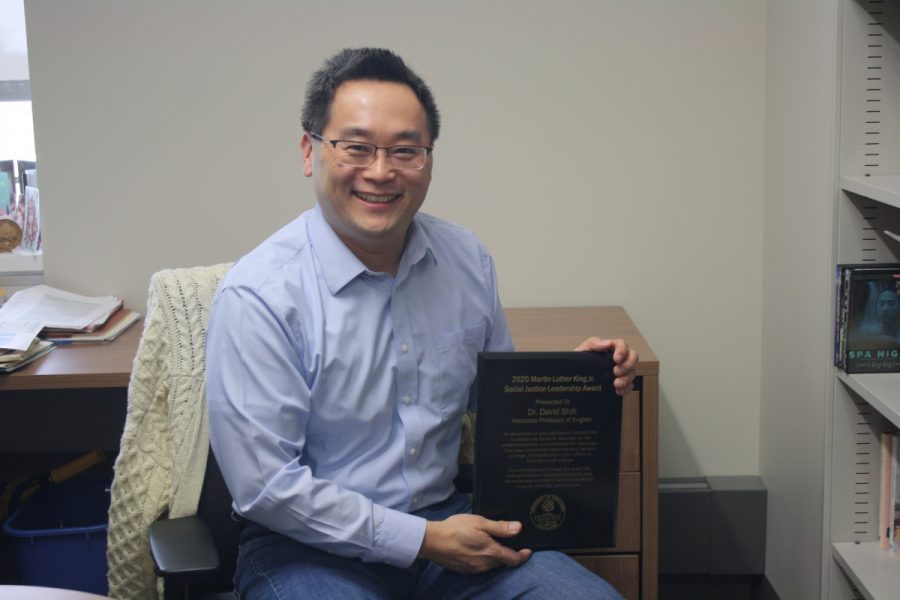David Shih wins the 2020 MLK award
English associate professor awarded for his social justice work on campus
Photo by Morgan Burke
Dr. David Shih, an English professor, and member of the English faculty since 1999, received the 2020 MLK Social Justice Leadership award on February 5, during the University’s annual Martin Luther King Jr. Celebration.
David Shih, an associate professor of English, was awarded the Martin Luther King Social Justice Leadership award for his continued work with EDI and engagement with anti racism efforts at UW-Eau Claire.
Shih accepted the award at the Martin Luther King Jr. Celebration on Feb. 5.
Shih started teaching at UW-Eau Claire in 1999, specializing in Asian American literature. He said in 2007 and 2008 he was asked to be more involved with Equity, Diversity and Inclusion.
“I was asked to be a part of (EDI) and that really changed the way I thought about myself and my relationship with social justice,” Shih said.
Another initiative Shih said he was a part of at the time was the College of Arts and Sciences diversity advisory committee, whose initiative was antiracist professional development.
“We brought in community organizers who had lots of experience organizing people for antiracist action and at that time in 2008 that wasn’t a word people used that much and still not used as much as I would like,” Shih said. “You hear euphemisms like equity, diversity and inclusion to mean antiracism, but certainly back then it was one that was new to a lot of people.”
According to an article posted by UW-Eau Claire, the antiracist mission is an essential element of meeting the institutional EDI goals and stated benchmarks for creating a more diverse campus.
Last year’s recipient of the award, Rose-Marie Avin, a professor of economics and director of women’s, gender and sexuality studies, presented this year’s award to Shih.
Avin said the award goes to a community member who is engaged in doing social justice work either at the domestic or global level.
“I think David won it because of all the social justice work he has done at the university, especially promoting equity, diversity and inclusion,” Avin said. “He has done a tremendous amount of work in that area so I think that the award was well deserved.”
Shih said he was involved with UW-Eau Claire’s liberal education core reform. He said it created some new outcomes for students, including one which specifically aligns with EDI, the R1 requirement.
“I was a part of a team that came up with the outcomes and the rubric for that particular measure and that was an important one because that outcome asks students to understand people as members of social groups and understand how power in society is divided unequally across those different social groups,” Shih said.
Another project Shih participated in was developing UW-Eau Claire’s critical Hmong studies. He said it began many years ago when students had asked for more academic focus for critical Hmong studies besides the social focus, like the Hmong students association.
One role Shih said he played in this project was in 2016 when he chaired a search committee to hire UW-Eau Claire’s first faculty member in critical Hmong studies.
The article posted by UW-Eau Claire goes on to mention how the face-to-face personal interaction with students is a cornerstone of Shih’s work.
Shih said every class he teaches he has students talk about equity, diversity and inclusion often through discussions of race and racism but also talking about other systems of privilege and oppression as well.
Avin said Shih is very giving in terms of helping people engage in EDI and tries to meet them where they are at.
“He’s not very judgemental and tries to help you reach the next level in terms of EDI,” Avin said. “I think that is really important because not everyone has that ability to understand.”
Avin said Shih thinks clarity is an issue with EDI. She said Shih has moral clarity and if she ever has questions, he gives her a better understanding of the issue.
“He has moral clarity and moral courage,” Avin said. “You need to have courage to talk about issues of race and racism in the United States.”
Avin said Shih has the ability to talk to people about a topic that can be difficult. She said that it’s how he has done a good job of involving EDI and helping people to understand the initiative.
“People are afraid to tackle that topic inside the classroom or outside the classroom,” Avin said. “David has the courage to do it and he does it in a very sensitive way by meeting the students where they are at.”
Shih said he asks his students to consider their own place in society by thinking about their own intersectional identities and the ways those identities may not be thought of as meaning very much for who they are.
He said it’s for them to consider themselves as members of social groups and their power in society, their access to rights and resources, has so much to do with their group identities.
“I think teaching about social justice and EDI has to begin with understanding yourself,” Shih said.
The important thing about learning EDI, Shih said, is that it gives everyone more choices for how to live their lives. He said the educational institutions that everyone has been a part of have simply not prioritized learning about EDI.
“You don’t learn about certain histories, you don’t learn about certain people, certain heroes,” Shih said. “You actually have fewer models for how to live your life.”
Avin said Shih wants to see the community move forward with EDI issues. She said when she and their colleagues see an issue of racism with the university they go to Shih’s blog.
“I know that I will get a very thoughtful explanation of what’s happening at the university,” Avin said.
Shih’s kindness, support and time he gives is what Avin said she appreciates from her colleague.
“He is so very supportive and can talk about issues of race and racism,” Avin said. “Not everyone can talk about race and racism in a very thoughtful, insightful manner and David can.”
VanDenMeerendonk can be reached at [email protected].

Macey VanDenMeerendonk is a senior English Creative Writing major. She likes to cook, go camping, and travel every chance she gets!

Morgan Burke is a fourth-year photography and multimedia communications student. This is her fourth semester on The Spectator, and first as Multimedia Editor. In her free time, she loves to make hyper-specific Spotify playlists and eat avocado toast.











